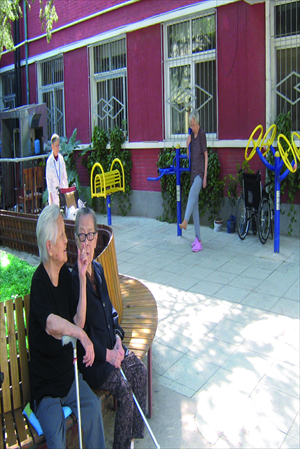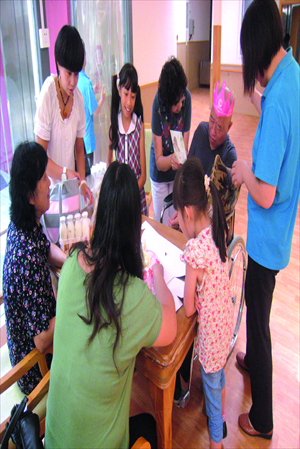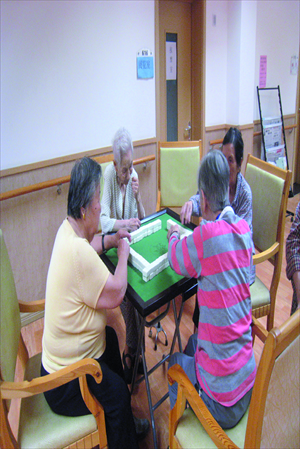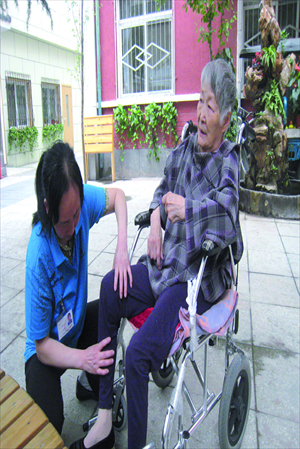Caring for China’s seniors




Although the air in Beijing was clear, Zhen Li refused to take off her face mask. As she admitted, she's afraid of being recognized.
"I'm facing a dilemma," said the 46-year-old finance manager, as she has still not decided whether to send her father, who is 74 and paralyzed, to a nursing home.
China's aging population is expected to become a concern in the coming years. Statistics from the China National Committee on Aging predict that by 2053, China will have more than 480 million seniors. Beijing is not immune to this trend toward an aging population, and many of its residents struggle to cope with how to care for elderly family members.
Public dilemma
According to Zhen, the thought of her father in a nursing home is very troubling, but she says she has few options.
"My husband and I work a lot and spend little time in the home. So when my father became paralyzed eight years ago, it was my mother who took care of him," she told Metro Beijing. "But now my mother's also getting weak." Zhen said she cannot hire a simple caretaker as her father needs nursing care. Caught in this bind, Zhen is still reluctant to make a decision. "I'm afraid of being criticized," she said.
Zhen's concerns are not unfounded, as many people in China believe that sending elders to nursing homes is unfilial. However, China has more than 33 million disabled seniors, 10.8 million of which have total permanent disability. These senior citizens need specialized care, yet many people cannot find a solution that satisfies them.
Today, Beijing has nearly 2.5 million senior citizens, but its 401 nursing homes have only 69,000 beds citywide, enough for only about 3 percent of the city's elderly population.
Nursing homes throughout Beijing vary greatly. While institutes owned by the city usually have better facilities and well-trained staff, they can be very difficult to get into. For example, Beijing No.1 Social Welfare Institute, Beijing's first publicly owned nursing home, has over 1,100 beds, but there is a waiting list of more than 9,000 for a bed.
Other facilities suffer from accessibility issues. Panjiayuan Aged Care Center is located on the third and fourth floors of a building with no elevator. Even the healthiest senior citizens may have difficulty living in this center, to say nothing of those with disabilities.
Wang Xiaolong, president of Cuncaochunhui Home for the Aged, a community caring center, told Metro Beijing that qualified personnel is also often lacking. "Most homes for the aged have few or no professional nurses on staff, which makes it difficult to provide sufficient care."
Private embarrassment
Li Jianguo, director of the Beijing Committee on Aging, told Metro Beijing that the government is working to address these issues.
"A policy governing the aging care market is being drafted now, but we are still in the research stage," he said. "The policy will set guidelines to evaluate these homes in terms of scale, type and quality to judge whether they can enter the market and to prevent possible problems."
Dang Junwu, deputy director of China Research Center on Aging, said China lacks regulations on this industry, which has led to the existence of many unsuitable establishments. "It is time to drive these institutes out and provide a healthy environment for qualified ones," he told Beijing Business Today.
While the government prepares new policies, insiders from private caring centers argue that they need help rather than regulations. "We operate at a loss," Wang said.
"The costs are too heavy," he said. "We only receive 200 yuan [$31.50] monthly from the government for every healthy senior we serve and 300 yuan for every disabled senior."
According to Wang, with China's aging society and the limited capacity of many public nursing homes, private care centers should be encouraged to carry the burden. "More subsidies would be really helpful," Wang said. "Real estate is another big factor. We only have 100 beds here, but if we had more space, at a cheaper price, we could serve more seniors."
Li Jianguo admitted that private care centers are financially overburdened. "We are also taking that into consideration," he said.
The issue of real estate is being addressed with a new policy from the Beijing Municipal Bureau of Land and Resources, which states that starting next year, land for building new nursing homes will be supplied by the government.
There's no place like home
The Beijing Municipal Bureau of Civil Affairs has announced in 2009 its 9064 Project. By the year 2020, 90 percent of seniors will receive care at home, 6 percent through community-based centers and 4 percent through professional institutes.
Wang Xiaolong applauds a future that focuses on senior care provided by community centers.
Many local community senior centers, both private and publicly owned, have a model that serves the seniors living in their facilities as well as those living in the surrounding neighborhood in their own homes. These places extend their services beyond what most city-run facilities offer.
"Many seniors don't want to leave their homes. It's better for them to stay in their own community," Wang said. His center provides meals for local seniors and invites them to activities like game nights. Its door is always open to them.
Wang Jin'e, 70, said her husband, who is paralyzed, recently moved into their local community caring center. "He has all-day care here and both of us are satisfied with it," she said.
As the future of China's aging society is still being shaped, Wang holds that one thing must be a priority. "Let seniors live near their homes, in their own communities, within their familiar environment. I think this is what the whole of society wants," he said.